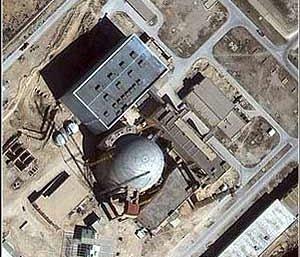Quick takes // by Ben FrankelWhistling past the graveyard: the Bushehr reactor
Iran is already inching toward a uranium-based nuclear weapon, and yesterday it started loading fuel into the core of its first nuclear plant at Bushehr, thus embarking on the plutonium path to the bomb; yes, the agreement between Iran and Russia, which operates the reactor, calls for Russia to retain control of the spent uranium rods — so that Iran could not separate weapon-grade plutonium from them; but what if Iran were to renege on the agreement, keep the spent uranium, and begin to process it? Would Russia invade Iran to regain control of its uranium?

Satellite of the Iran's Bushehr reactor // Source: mideastsecurity.co.uk
The covert sabotage campaign by Israel and the United States slowed down the activation of Iran’s nuclear reactor at Bushehr, but the campaign was only a delaying tactics.
Yesterday, Iran started loading fuel into the core of its first nuclear plant at Bushehr, and officials expect it will be fully operational by next year.
This means that Iran, in addition to being well on its way to produce an enriched-uranium nuclear weapon, has now embarked on the plutonium path to the bomb.
The plant has had a number of setbacks, including delays in getting the fuel from Russia, which has built the plant, and an attack by the computer worm Stuxnet earlier this fall.
A nuclear proliferation expert told Fox News that fueling the plant is not an act of defiance, rather, it is the natural next step for Iran.
Fox News reports that what concerns nuclear experts is the fact that once Bushehr does go on line, Iran will be the first of its neighbors to have a nuclear power plant, and that could spark some sort of dangerous nuclear race.
The report adds that Bushehr is not considered to be a proliferation risk, if it is used correctly. Uranium is not enriched there — that happens in the Natanz facility. The UN Security Council resolutions passed demand that Iran halt enrichment, something it has refused to do.
The BBC reports along the same lines, quoting experts to say that as long as the Bushehr plant is Russian-operated and supervised by the UN nuclear watchdog the International Atomic Energy Agency (IAEA), there is little chance of proliferation.
I fact, there are strong suspicions that the West has given a green light to the 1,000-megawatt reactor being fired up in a behind-the-scenes deal with Russia, says the BBC’s Tehran correspondent Jon Leyne.
Under this deal, it is believed that Washington agreed to the opening of the reactor in return for Russian support for new sanctions on Iran.
Both the Fox New report and the BBC’s highlight the fact that as long as Bushehr “is used correctly” (Fox News), or “is Russian-operated and supervised by the UN nuclear watchdog the International Atomic Energy Agency (IAEA),” it poses little proliferation risk.
Up to a point, both reports are correct. The trouble is this: Bushehr poses a proliferation risk not because it is a place where uranium is being enriched. Rather, it is a place where uranium is used at the core of the reactor and, over time, becomes spent.
Iranian could take the spent uranium rods from the reactor and process them in a separation plant to extract plutonium, then build plutonium bombs. This is what the seven declared nuclear weapons countries — and one undeclared power, Israel — do.
The current agreement between Iran and Russia calls for Russia to take back the spent uranium so Iran has no access to it. The question is this: what if Iran refused to give back the spent uranium? Would Russia invade Iran and take the spent uranium back?
If Iran is smart — and everything the country has done on the nuclear weapons front so far tells us that Iran is smart — it would allow quantities of spent uranium to accumulate before putting its foot down, telling Russia it wants to renegotiate the agreement. While talks drag on, Iran would separate the plutonium from the spent uranium, and would be in a position to build powerful hydrogen bombs.
Those who sagely say that Bushehr does not pose a nuclear proliferation risk are whistling past the graveyard. Such whistling may alleviate the immediate fear or discomfort, but it does not solve anything. The problems which gave rise to the fear in the first place still must be addressed.
Ben Frankel is editor of the Homeland Security NewsWire
